SEO Keywords
SEO keywords are words or phrases used in your website copy to help match your web pages rank in search with the terms people are searching for. The keywords and keyword phrases used in your website copy should be ones that are most closely associated with the product or service that you offer. You find these keywords through the process of Keyword Research using online keyword research tools (more on keyword research later).
The use of SEO keywords consistently throughout your website helps ensure that you are attracting visitors to your website in a way that aligns with their search intent. Search intent refers to way individuals search for a product or service in the category that you offer.
Benefits of SEO Keywords
Let’s say an individual is not familiar with your company, product, or service. If the keyword or keyword phrase usage in your copy matches that of the searcher’s intent, there’s a good chance your website and related web page will show up in organic search for that query.
By the way, the term “organic search” refers to the listings of website pages that appear on a SERP — Search Engine Results Page — when you type in a search query. This is different than “paid search” which are ads at the top, bottom, or side of the page that appear based on the same keyword query.)
Keyword Classifications
There are many different classifications of keywords based on the media type where the keyword is being used. Media types include organic search, paid ads (such as Google ads), remarketing, to name a few. Here are some of the most popular types of keywords by classification.
Market Segment Keywords
Market Segment Keywords are generic keywords that are most closely associated with your brand or product.
Example: “electric guitar”
Customer Defining Keywords
Customer Defining Keywords are those that identify a subset of the customer base.
Example: “electric guitar for teenager“
Primary Keywords
Primary Keywords include core brand keywords that are highly relevant to the product or service that you offer. Each page on your site should have a primary keyword association for search optimization.
Example: “Stratocaster electric guitar“
Related Keywords
Also known as LSI (Latent Semantic Indexing) keywords. These are keywords that have close association with your primary keyword. Each page on your site should have one primary keyword and 3 to 4 related keywords to help ensure the page will be found during relevant searches.
Examples: If the primary keyword is “Stratocaster electric guitar,” related keywords could be: “Stratocaster electric guitar reviews,” “Stratocaster electric guitar colors,” “Stratocaster electric guitar pickups,” “Stratocaster electric guitar performers.“
Competitor Keywords
Competitor Keywords are keywords that target associations with a close competitor. The goal of using competitor keywords is to attract customers who may be searching on those terms to consider your product or service as well. One key note: this is not the same as listing your competitor’s name on your pages out of context, just to attract clicks. This is not recommended and can get your penalized by Google and other search engines.
Example: “Gibson Les Paul electric guitar“
Geo-Targeted Keywords
Geo-targeted keywords are those that associate a location with the searcher’s intent.
Example: “Electric guitar retailer Austin“
Long-tail Keywords
Long-tail keywords are keywords that are relevant to your product or service category but may not be as frequently searched on as core keywords. I’ll discuss the benefits of longtail keywords further down in this article.
Example: “electric guitar for jazz combo“
Why are Keywords Important in SEO?
Google indexes billions of pages on the web every day and by recent estimates there are almost 6 billion searches a day. That’s a lot of content, and a lot of pages for search engines to crawl and index!
A research study performed recently by Ahrefs, a leading search engine analytics company, found that over 90% of pages on the web never get a single view or visit. A key reason is the lack of use of SEO keywords in content. See graphic below.
What is Keyword Research?
Keyword Research is the process of matching popular keywords or keyword phrases for a category or classification to the content being written about a product or service in that category or classification.
For example, if you sell electric guitars (using the previous example above) and knew that a large number of people searching for information on electric guitars used the phrase “Eric Clapton guitar,” would you want to incorporate that phrase into your website copy?
Of course!
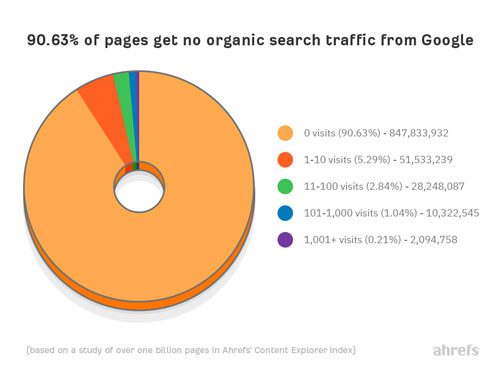
Less than 10% visits is an alarming number and should be a concern for any business looking to build a presence on the web.
Think about it: if over 90% of the billions of pages on the web never get one view, is it because the content is poorly written?
Chances are, no. There is a lot of great content on the web that never gets seen. Why is this? One good reason is that this content is likely not using SEO keywords. And so the search engines ignore it when indexing pages.
So the reason keywords are important in SEO is to help the search engines make sure the content that ranks is search matches the content that exists of the web.
By recommending keywords and keyword phrases that are relevant — meaning keywords that are popular in search for a particular topic on classification — a digital PR or SEO consultant will help ensure that your content falls into the 10% of content that does get indexed and seen by search engines.
So, how do you know what these popular, relevant keywords are? That’s where the science of keyword research comes in, which I’ll discuss next.

Eric Clapton at Madison Square Garden, May 1, 2015
Keyword Research is the science of using digital tools to uncover Google trends in search. SEO specialists that have and use these digital tools can weed through the thousands of keyword candidates matching your product or service and recommend how to incorporate these keywords into your website copy so your content can be ranked high in organic search.

Some of these keyword research tools are free, but most of the robust tools are feature-rich and have monthly or yearly associated costs. A few of the paid tools that I use in my SEO and Digital PR practice are Moz, SEM Rush, Ahrefs.

Before moving on from the subject of keyword research, it should be reiterated that it’s not a good idea to post copy on your website that doesn’t have some form of keyword research behind it. Remember: there is a lot of well-written content on the web that never gets seen. This is largely because the website owner or author did not do keyword research before writing.
Don’t skip the SEO keyword research step!
Competitors and SEO Keywords
So now that I’ve established the importance of keyword research, let’s talk about competitors and SEO keywords. Why worry about your competitors if you have done (or plan to do) keyword research on your topic?
It has a lot to do with the principle of Positioning, which states that “Companies don’t position products and services, people do.” In other words, your market position in a product or service category is not what you say it is, it’s what people think it is. And this thinking influences how they perform search queries, whether it’s typing into Google search or asking verbally (“Hey Siri, what’s a good electric guitar?”)
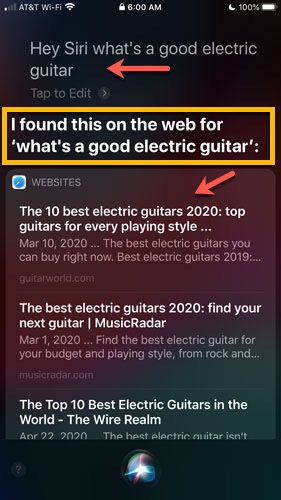
The reason: unless you offer a product or service that has no possible alternative for people to consider, people looking for a product or service are going to start their search query with general search terms. These are terms that have a high degree of relevance to the topic or category, with little specificity as to the brand or model number.
Let’s circle back to the electric guitar example. Remember the mention earlier of the keyword classifications? Typically, search queries start with what could be considered a Market Segment keyword search. This is a very general, non-specific search such as:
“affordable electric guitar“
Or
“Electric guitar with maple neck“
Unless you are the only company that makes guitars with maple necks (insight – there are hundreds of companies that make such guitars) you are going to be competing with all the other websites that have content on electric guitars with maple necks.
So having an insight into which pages on the subject of “electric guitars with maple necks” are appearing highest is valuable information. It helps you understand what keywords and keyword phrases are driving traffic to those pages. In other words, those keywords and keyword phrases the search engines are indexing and “liking” during the crawl of the billions of pages.
For this reason, having an insight into those keywords or keyword phrases that are working for your competitors — particularly at the Market Segment research stage, where general search queries are the rule — is critical in getting your pages indexed with the goal of having a potential customer visit your website on that particular subject.
Using the keyword research tools I mentioned above streamlines the process of identifying these core keywords and keyword phrases. Understanding the importance of competitors and SEO keywords is essential in success in search engine marketing.
What is a Long-Tail Keyword?
I mentioned the Long-tail keyword earlier in the section on Types of Keywords. While long-tail keywords are just one of many types of keywords, these are perhaps the most important keywords to use — particularly as you are starting out in your SEO efforts.
Long-tail keywords are keywords that have a high degree of relevance and association to your product or service, but don’t have as much volume in terms of search as other keywords. The phrase “long-tail” refers to the way this classification of keywords looks on a chart showing the universe of keywords associated with a product or service in a particular category.
See the following graphic:
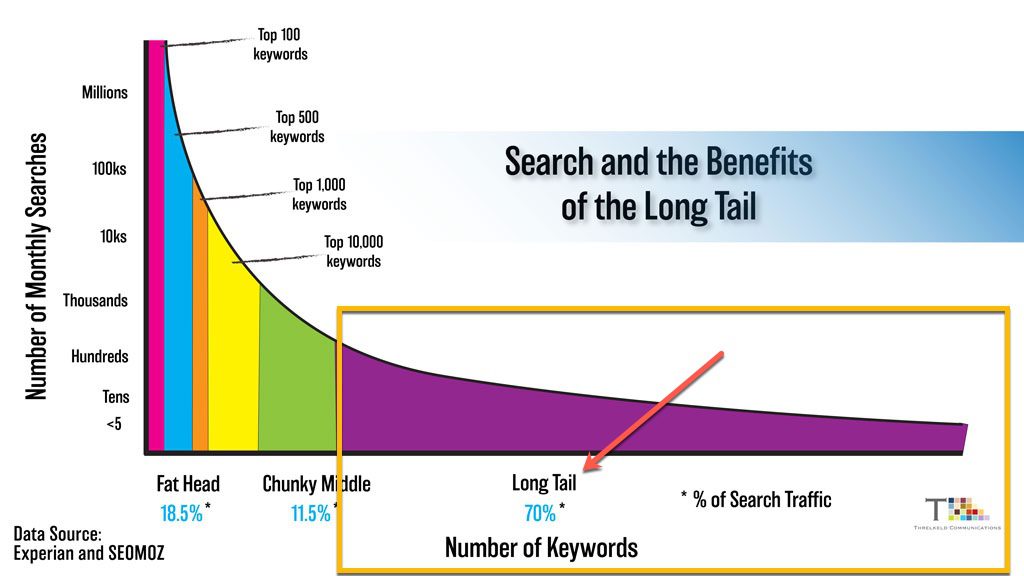
While long-tail keywords are not as popular as those in the “fat head,” they are still relevant to the search query category. In other words, they still get decent volume in terms of search. But, and this is a key point, these keywords are not nearly as competitive in terms of ranking in search.
Which opens the possibility that you can rank higher in search for these long-tail keywords in organic search. Kind of like getting your foot in the door for the chance to move on to a greater opportunity.
Let’s go back to the electric guitar example. Using the SEMRush keyword tool, a search on the popular phrase “best electric guitar” shows an on-average volume of 6,800 searches a month over the last 12 months. This search term results in Google displaying close to 758 million pages that fit this search criteria.
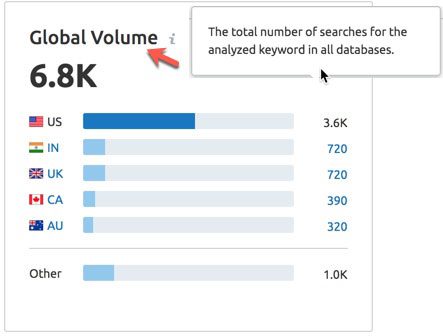
Considering that “best electric guitar” represents the “fat head” component of this search, what might a long-tail option be?
By qualifying the search term with “under $1,000,” we have drilled down to a more manageable query in terms of ranking for search. Note that, in most cases, a long-tail search query is generally longer in terms of length as well. This is because the generalized search term now has some modifiers, such as “under $1,000.”
Let’s take a look at the Search Volume on this keyword:
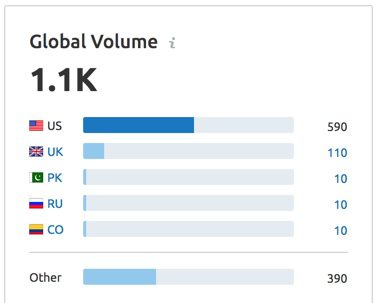
1,100 queries per month. Less than the general query of “best electric guitar,” but definitely still a desirable number of queries per month.
And the Keyword Density (KD)?
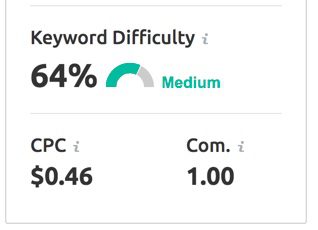
Show keyword density screenshot.
Medium competitiveness on this keyword, which means you will be able to rank higher, faster, than you would for the “big head” keyword. And because the search query “best electric guitar under 1000” is still relevant to the “big head” query, there’s a relatively good chance you can appear on page 1 of search for this term, while the chance of appearing on page 1 of search for “best electric guitar” would be slim at best.
Summary
Keywords and SEO are like hand and glove when it comes to success in digital marketing and digital PR. Understanding how keywords impact your chances of getting ranked high in search needs to be a first priority when creating copy for your web pages.
Start with competitive keyword analysis using keyword research tools, find your long-tail keywords, and then begin creating content that maximizes the value of your core keywords and improves your chances of getting ranked higher in search.
